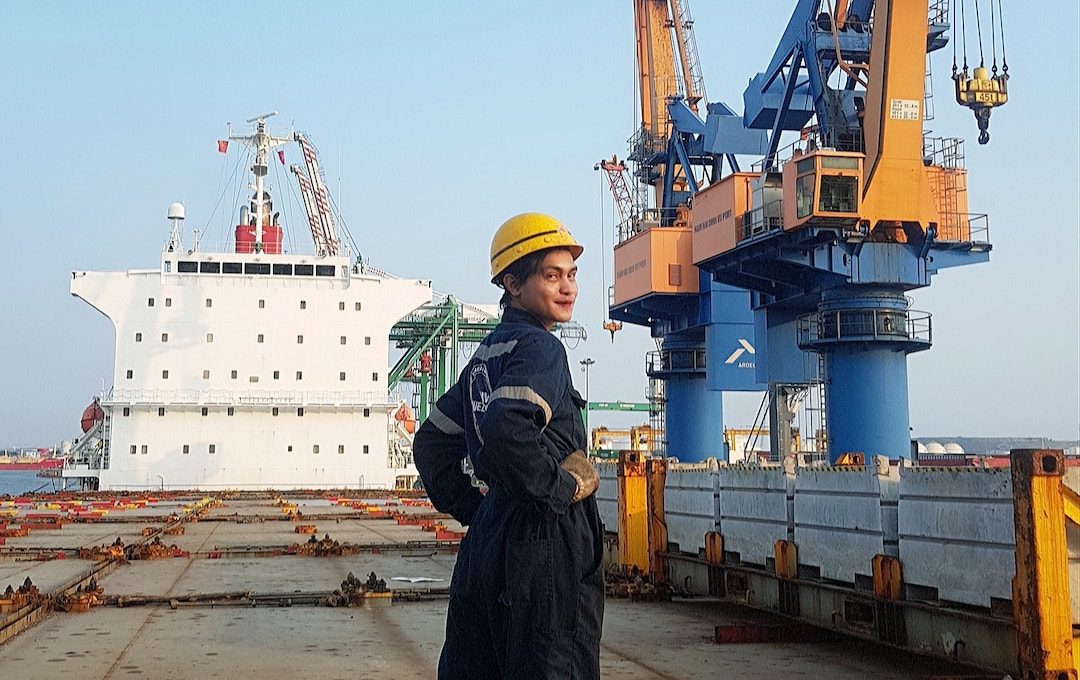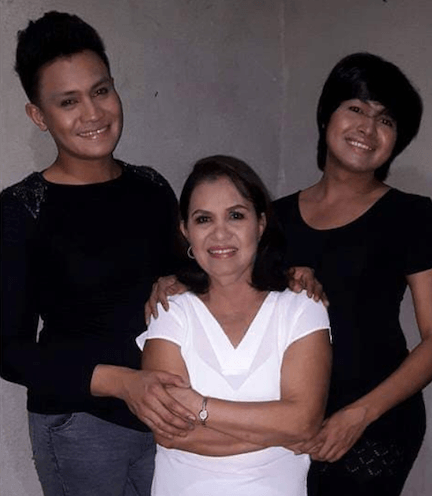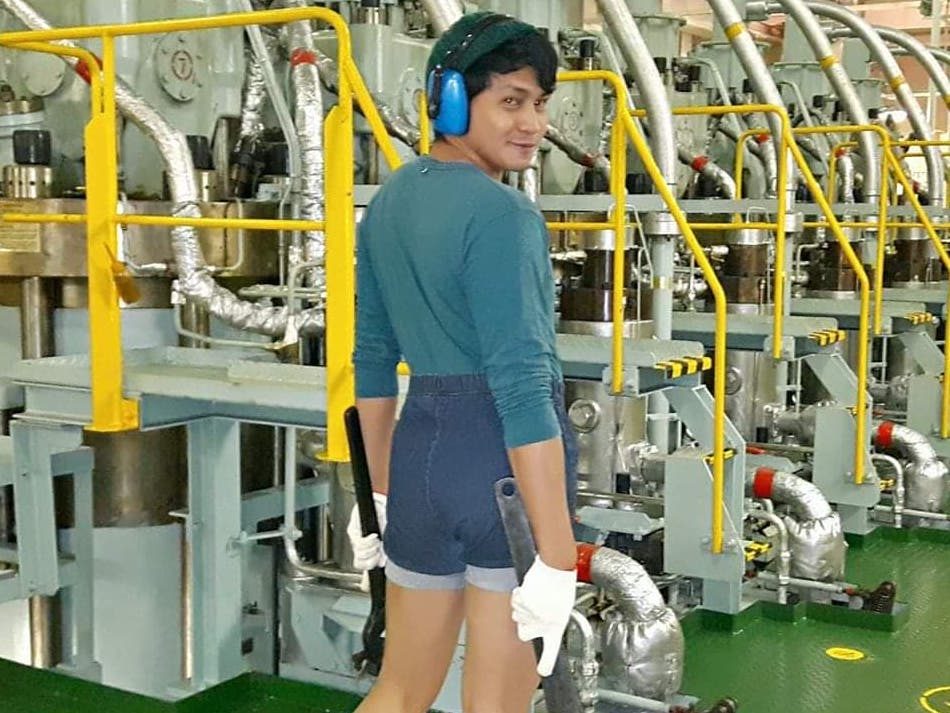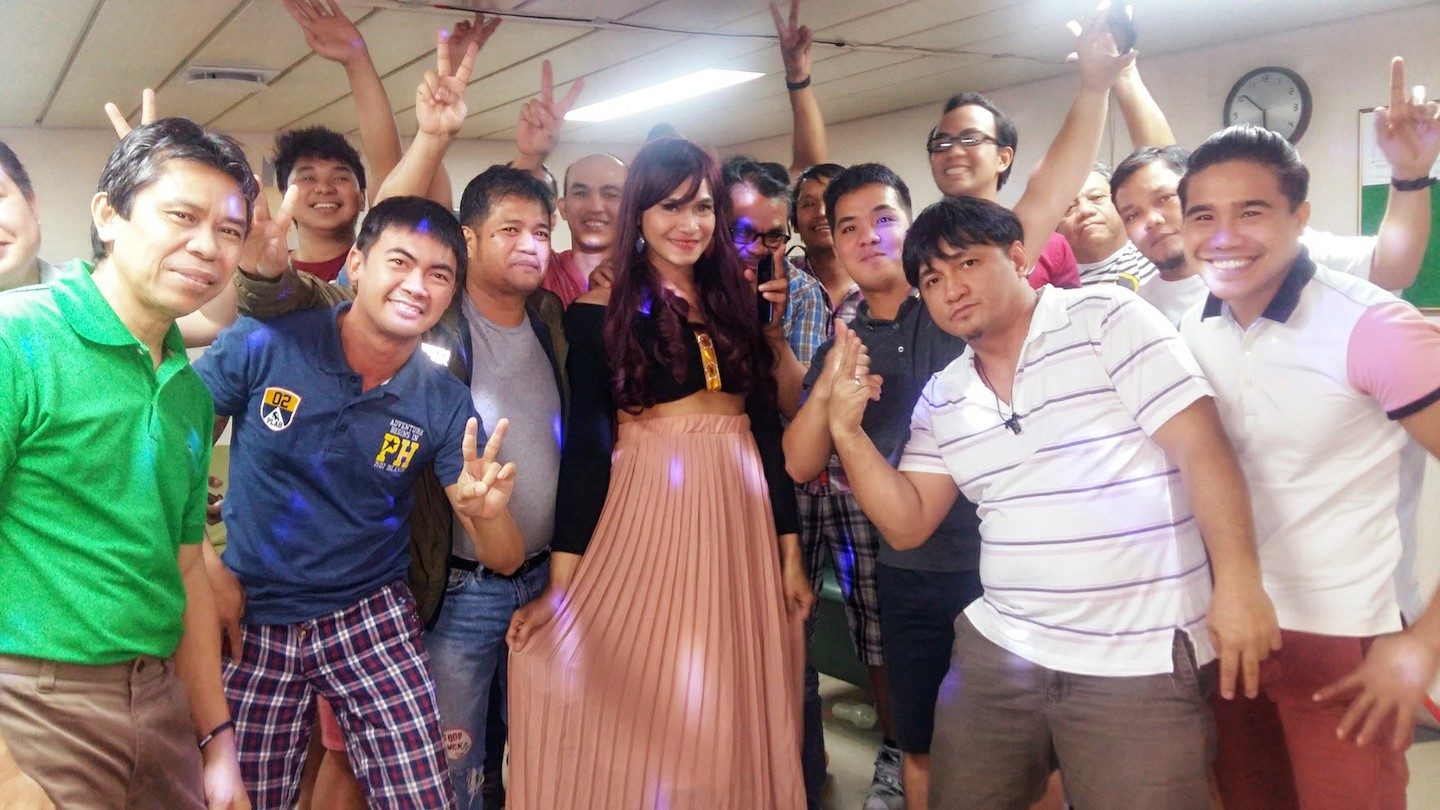SUMMARY
This is AI generated summarization, which may have errors. For context, always refer to the full article.

MANILA, Philippines – On their ship, she’s the “queen of the seas” who sits on a literal iron throne. She holds a wrench for a scepter and wears a hard hat for a crown. You’ll see her walking around the ship’s hallways – head high, hips swaying like the waves.
They call her “Dyosa Makinista,” the “machinist goddess.” But before that, she was called many things: angel, demon, that good-for-nothing gay seafarer.
Dyosa grew up in a small town in Laguna as Aljon Buquid Asusano, the youngest of 5 children, raised by a single mother.
Small town girl
Having only sons, Dyosa’s mother craved for a daughter. Dyosa said this may be the reason why her mother has been very supportive of her youngest being gay. On some days, she would even dress up the young Dyosa and help her put on make up.

Dyosa’s brothers were equally supportive. They never questioned her sexuality nor did they ever make her feel unwelcome. Among the 5 brothers, the youngest two came out as gay.
Lucky for Dyosa, the community she grew up in accepted people from the lesbian, gay, bisexual, transgender, queer (LGBTQ+) community.
“Sa bayan namin, maraming bakla. Sa kabilang bayan, maraming tomboy (In our town, there are a lot of gay men. In the other town, there are a lot of lesbians),” she joked.
Unlike many Filipino LGBTQ+, she had a happy childhood in her small town and home, where she never had to hide her queer self. (READ: Rappler Talk: What it takes for the LGBTQ+ to #ResistTogether)
The start of a journey
Dyosa had to leave her sanctuary when she pursued higher education. She decided to enroll in the Maritime Academy of Asia and the Pacific (MAAP), a seafaring school in Bataan.
Since she was a kid, all Dyosa ever wanted was to travel the world. Her mother told her that there were only two jobs that would let her do that: working as a seafarer or flight attendant. Dyosa wanted to be the latter but she was told they didn’t have the money for it. Fortunately, one of her older brothers was a seafarer and was willing to finance her studies so she can follow his path.
Her first year in maritime school was the first time Dyosa had to be “discreet” about being gay. There was no rule against gay men in MAAP but with its regimented training program, Dyosa assumed it would be better to keep a low profile to avoid discrimination.
This is the sad reality for LGBT folks, Dyosa said. By default, you assume the world would be cruel to you so you hide your true self just to be safe.
“Ang takot ko noong una ay baka bawal ang bakla, kasi ang training panglalake. Akala ko kailangan ko magtigas-tigasan ako (I was afraid at first that they may not allow gay men, because the training was for men. I thought I had to pretend to be tough),” she said.
She eventually proved herself wrong as she later found out that MAAP doesn’t discriminate against anyone. After hearing the school’s executives say so themselves, Dyosa started coming out to her friends in school. To her surprise, they embraced her being gay, and they often protected her from other naysayers.
Little did Dyosa know that her coming out as gay in school had some unintended benefit: some of her queer juniors, after seeing her being openly gay, had the courage to come out as well.
Waves of discrimination
Life has been fair to Dyosa until maritime school, having been surrounded by people who accepted her. This did not prepare her for her first taste of discrimination on board a ship.
Months after graduating from MAAP, a company finally hired Dyosa as an engine cadet. Engine cadets are like understudies for ships – they go onboard as trainees before they become full-fledged officers. (READ: Gender equality advocates to launch campaign to end violence against LGBTQ+)
It wasn’t the job itself that made life difficult for Dyosa, but some of the officers she worked with.

These officers would shamelessly judge Dyosa for being gay. Often, they would make her feel worthless, insinuating to her that openly gay people had no place on the ship. Dyosa felt isolated. Oftentimes, she was excluded from gatherings.
During breaks, Dyosa would find herself eating in her room because they wouldn’t stop hurling insults if she ate in the mess rooms. “’Pag kasama ko sila, ako ‘yung ginagawa nilang meryenda – sa panglalait, pangtatakwil (When I’m with them, I become fodder for insults, ostracism),” she said.
On the walls of the engine room, Dyosa would also often find graffiti of their offensive nicknames for her. “Angel bakla (gay)” or “Angel demon” were just some of the scribblings she saw on the walls. They used to call her “Angel” on her first ship after one of her bosses said she looked like Filipino celebrity Angel Locsin.
As if those weren’t enough, Dyosa later found out that one of the officers complained to their company that she was “incompetent and gay.”
“Wala daw akong alam sa trabaho. Puro lang daw ako kabaklaan, kalambutan. Ang dapat daw sa ‘kin rumampa na lang, mag-make up artist na lang. ‘Di ko daw alam ‘yung ginagawa ko,” she said.
(They said I didn’t know anything about my work, that all I know was being gay, soft. They said I should just walk the runway or become a makeup artist. They said I didn’t know what I was doing.)
Dyosa and her company knew the report was largely just anchored on her being gay. She, after all, received a gleaming recommendation letter from her chief engineer – proof of her hard work and determination. (READ: ‘Tolerated, but not accepted’: Filipino LGBTQ+ speak up vs discrimination)

Faith in humanity restored
The discrimination Dyosa experienced on her first time on board traumatized her so much that she considered not returning to work. Fotunately, she was able to get over this slump and decided to give seafaring another chance.
This time around, Dyosa pledged to use that experience as inspiration and work many times harder to prove her worth.
“Nagpursigi ako. ‘Akala ‘nyo walang magagawa ang bakla sa barko ah? Sige, tingnan natin.’ Pinatunayan ko na kahit bakla ako, kaya ko (I worked hard. ‘You think a gay person can’t do anything on the ship? Fine, just watch.’ I proved that even though I’m gay, I can do it),” she said.
Eventually, her hard work paid off and she was recognized by her colleagues. Dyosa eventually made friends onboard who treasured and protected her. She realized that most seafarers were not like the officers who discriminated her before.

In fact, Dyosa, now on her fifth ship, said that her colleagues often treated her “like a real woman.” She said that it’s very rare to have an openly gay person on board, and so they tend to take care of them.
“Inaalagaan nila ‘yung bakla. [Sabi nila], hindi natin siya tingnan bilang bakla. Kung ano ang tingin niya sa sarili niya, ‘yun ang trato sa ‘yo (They take care of the gays. They said that they won’t just look at them as gays. Instead, they’d see them the way they’d want to be seen),” she said.
Her colleagues treasured Dyosa so much that on her birthday in 2018, they surprised her with a birthday party that’s similar to a Filipino debut. She was asked to wear a dress and was taken to a fully-decorated room with a spread. Inside were her colleagues in decent clothing, who each danced with her and gave her 20 cakes and 20 wishes.
Queen on a mission
Now on her fifth ship, Dyosa finds herself in a happy place.
Dyosa used her hard-earned money to pay her dues. Dyosa regularly sends money to her mom, her number one supporter. She willingly took this responsibility from her brothers, who now have families of their own. She said it was only fair as she was “gay and single.”
“May mga pamilya na sila. May pinagkakagastusan. Since bakla naman ako at kumikita ng maayos, sinusuportahan ko na mama (They have their own families already. They have their own expenses. Since I’m gay and earning well, I’m supporting my mom),” she said.
Dyosa admitted that her job remained hard and, as any seafarer, she’d get sad and yearn for home often. There was also still a lot of work needed to make seafaring truly inclusive, but for her, “LGBT folks are always born ready” and are able to overcome and improve from challenges at sea.
Today, if you’re lucky to get an audience with the queen of the sea and ask why she chose her iron throne, Dyosa has one thing to say: “Because I can! If others can, why can’t I?” – Rappler.com
Add a comment
How does this make you feel?
There are no comments yet. Add your comment to start the conversation.